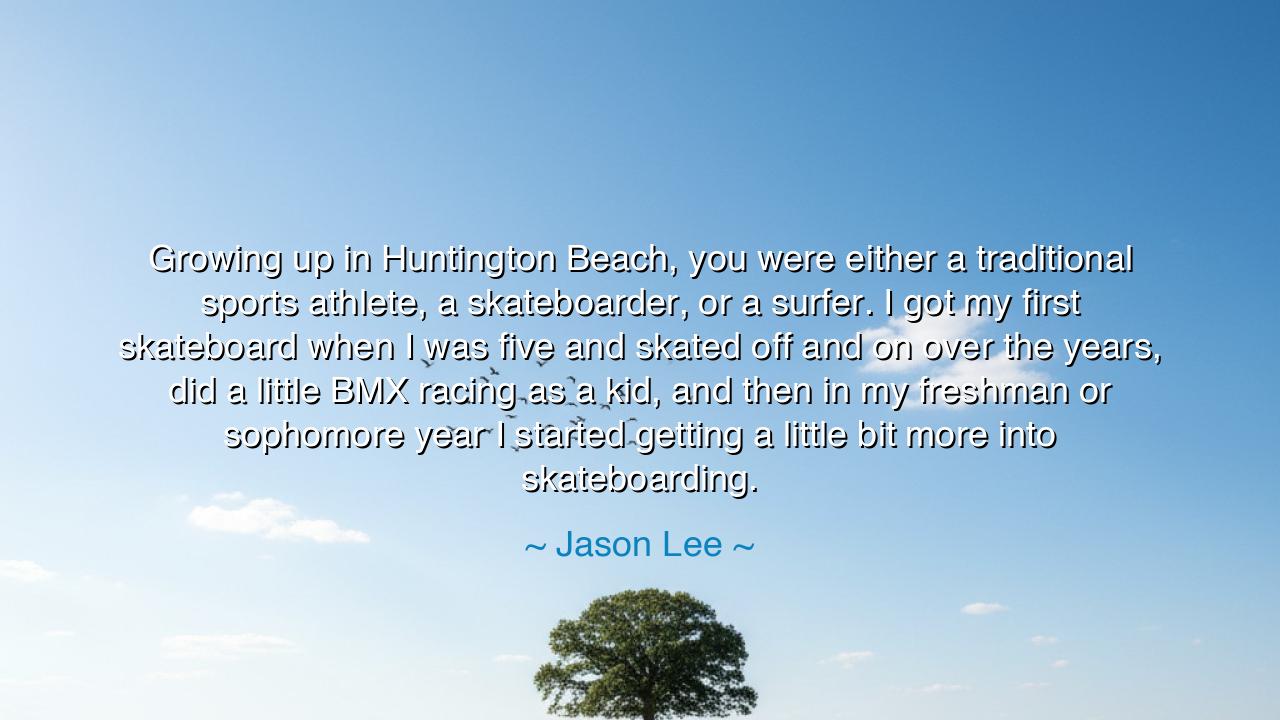
Growing up in Huntington Beach, you were either a traditional
Growing up in Huntington Beach, you were either a traditional sports athlete, a skateboarder, or a surfer. I got my first skateboard when I was five and skated off and on over the years, did a little BMX racing as a kid, and then in my freshman or sophomore year I started getting a little bit more into skateboarding.






When Jason Lee recalled, “Growing up in Huntington Beach, you were either a traditional sports athlete, a skateboarder, or a surfer. I got my first skateboard when I was five and skated off and on over the years, did a little BMX racing as a kid, and then in my freshman or sophomore year I started getting a little bit more into skateboarding,” he was not merely speaking of childhood hobbies. He was painting a portrait of identity shaped by culture, place, and passion. His words remind us that the environments we grow up in present us with paths, and the choices we make among them can define who we are and what we will become.
The origin of this quote lies in Lee’s beginnings before he became known as a Hollywood actor. Long before the cameras, he was a skateboarder, deeply embedded in the surf-and-skate culture of Southern California. Huntington Beach, with its sun-soaked streets and coastal energy, was a crucible of identity for young people. One either embraced the rigor of traditional sports, or the rebellion and creativity of skateboarding and surfing. For Lee, the skateboard was more than wood and wheels—it was freedom, a way to express individuality in a world that often demanded conformity.
History, too, gives us echoes of such cultural divisions. In ancient Greece, young men were expected to enter the gymnasium and pursue wrestling or running, training their bodies for the service of the polis. Yet alongside these athletes were the poets, the dramatists, the philosophers—those who took a less traditional path, shaping the spirit rather than only the body. Like Jason Lee choosing the skateboard over conventional athletics, these figures proved that greatness is not confined to tradition, but can be found in the margins where creativity and passion thrive.
Lee’s words also highlight the spirit of experimentation. He mentions BMX racing, skateboarding off and on, and then returning to it with greater focus in adolescence. This reflects a timeless truth: that identity is rarely fixed from childhood, but often forged through trial, error, and rediscovery. The seeds planted at age five with his first skateboard would later blossom into a deeper passion, teaching us that sometimes our earliest joys return to us later as guiding forces.
There is also in his story the undertone of belonging and rebellion. To be a “traditional athlete” was to walk one well-worn path, safe and familiar. To be a skateboarder or surfer was to embrace a culture that resisted conformity, that sought freedom on the waves or in the streets. Lee’s choice reveals the courage to follow the unconventional, to embrace the risks of falling, bruising, and failing—because in those struggles lay authenticity. Such choices remind us that the noblest victories are not always those celebrated by the crowd, but those that align with the soul’s true calling.
The lesson for us is this: do not fear the paths that diverge from tradition. Whether in childhood or in adulthood, listen to the passions that stir your spirit. Try, explore, return to what calls you, even if you stray for a time. For it is not the uniform of tradition that defines your greatness, but the fire of your devotion. A skateboard beneath your feet, a pen in your hand, a song on your lips—these may seem small things, but they may hold the key to your destiny.
So let us remember Jason Lee’s words: “I got my first skateboard when I was five… and then I started getting a little bit more into skateboarding.” They remind us that the sparks of childhood are not accidents, but seeds of identity waiting to bloom. Let us cherish them, follow them, and nurture them, for in those early passions lies the compass of our true life’s journey.






AAdministratorAdministrator
Welcome, honored guests. Please leave a comment, we will respond soon